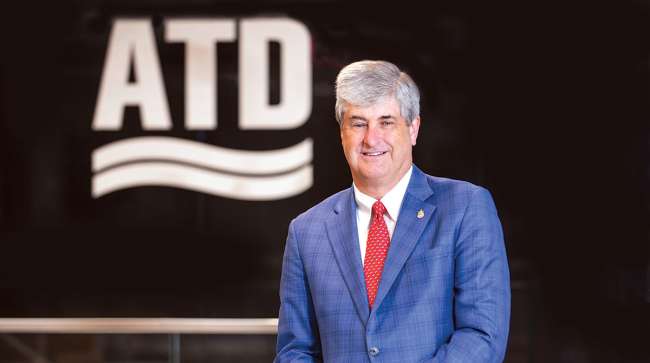Senior Reporter
FET on Heavy-Duty Trucks Deters Sales, ATD Says

[Stay on top of transportation news: Get TTNews in your inbox.]
Industry-led attempts to repeal the 12% federal excise tax on heavy-duty trucks, which also covers trailers more than 26,000 pounds, went — yet again — to Capitol Hill.
Advocacy presentations took place virtually beginning June 22 before lawmakers who must operate under ongoing COVID-19 restrictions, according to American Truck Dealers, which is leading the latest effort.
The push to repeal the tax comes as the Biden administration is proposing multiple ways to combat climate change, and alongside the wave of new heavy-duty trucks equipped to lower sharply harmful carbon emissions.
“Our whole goal is to encourage Congress to repeal the 12% FET on heavy-duty trucks because we think it is not as relevant as it used to be. It is an old outdated tax,” said ATD Chairman Steve Bassett.
PERSPECTIVE: Pivotal Opportunity to Repeal FET
ATD is a division of the National Automobile Dealers Association that represents more than 1,700 medium- and heavy-duty truck dealerships.
Other industry experts agreed with ATD’s position.
“The repeal of the FET is the best option, however last year’s effort [in Congress] was asking for a temporary suspension, and there could be compromise positions yet needed to get something — anything accomplished,” said Allen Schaeffer, executive director of the Diesel Technology Forum, an advocacy group.

Schaeffer
“Reforming [the tax] might be less offensive to some who might oppose tax cuts in this space outright and more of an opening to others who could get behind reducing it or sunsetting it or other adjustments,” he said.
The tax was levied in 1917 to pay for World War I and was then 3%. ATD’s written history of the tax noted it has been “briefly eliminated, raised twice prior to World War II, increased again and rolled into the Highway Trust Fund in 1956, repealed by the Senate in 1975, and increased to 12% in 1982.”
Mike Roeth, executive director of the North American Council for Freight Efficiency, called the repeal “a logical step.”
On June 22, Sen. Todd Young (R-Ind.) was the keynote speaker during the virtual legislative briefing, and ATD referred to him as “a Senate FET repeal champion.”
The auto sector, including auto dealers, has long played a crucial role in Indiana’s economy. It was a pleasure to speak with Hoosier members of @NADAUpdate about the state of the industry and the need to repeal the archaic federal excise tax on heavy duty trucks. — Senator Todd Young (@SenToddYoung) June 22, 2021
On the House side, Rep. Chris Pappas (D-N.H.) remains onboard, Bassett said. Pappas gathered support last year for a temporary repeal of the FET during the pandemic.
“The FET is tied to truck sales. You can have really good years or very weak years,” Bassett said. “And the [highway] funding needs to be more consistent year after year by having it based on users rather than the purchases of trucks, which are cyclical.”
The FET generated the following amounts for the Highway Trust Fund, ATD reported citing Federal Highway Administration statistics:
- 2019: $5.33 billion
- 2018: $4.33 billion
- 2017: $3.11 billion
Incentives are needed to get “cleaner, greener, safer trucks on the road,” Bassett said, and noted 50% of the trucks on the road are more than 10 years old.
“You are talking about a tax that is from $12,000 to $22,000 per truck on average [with an internal combustion engine]. That is a big disincentive for a customer to buy a new truck,” he said.

On May 25, five people pleaded guilty to staging two accidents in New Orleans with tractor-trailers in 2017, while obtaining fraudulent financial settlements totaling more than $282,000. Is the situation surrounding fraudulent settlements getting worse or better in 2021? Host Michael Freeze talks with TT's Eric Miller and Eleanor Lamb. Hear a snippet above, and get the full program by going to RoadSigns.TTNews.com.
Heavy-duty electric trucks are covered by the FET, too, and likely to cost more, said Bassett, who also is the owner of General Truck Sales in Muncie, Ind.
A survey by American Trucking Associations determined nearly 60% of fleets indicated that absent the tax they were either somewhat or very likely to purchase additional trucks and/or trailers beyond their scheduled buy period, Transport Topics reported last year.
Mark Parker, director of sales and marketing for Baltimore Potomac Truck Centers Inc. — and ATD’s NextGen chairman — told TT one customer said to him, “I don’t want to pay FET so I’ll just buy an older used truck.”

Parker
Truck dealers are responsible for collecting and remitting the tax, and arriving at the amount due can be complicated, according to NTEA, which represents the work truck industry, and has a 165-page guide for their members on how to comply with the FET.
The coalition looking to repeal the FET on heavy-duty trucks and trailers in addition to ATD and NTEA, includes: ATA’s National Tank Truck Carriers affiliate, National Trailer Dealers Association, the Truck Renting & Leasing Association and the Truck and Engine Manufacturers Association.
Want more news? Listen to today's daily briefing below or go here for more info:

